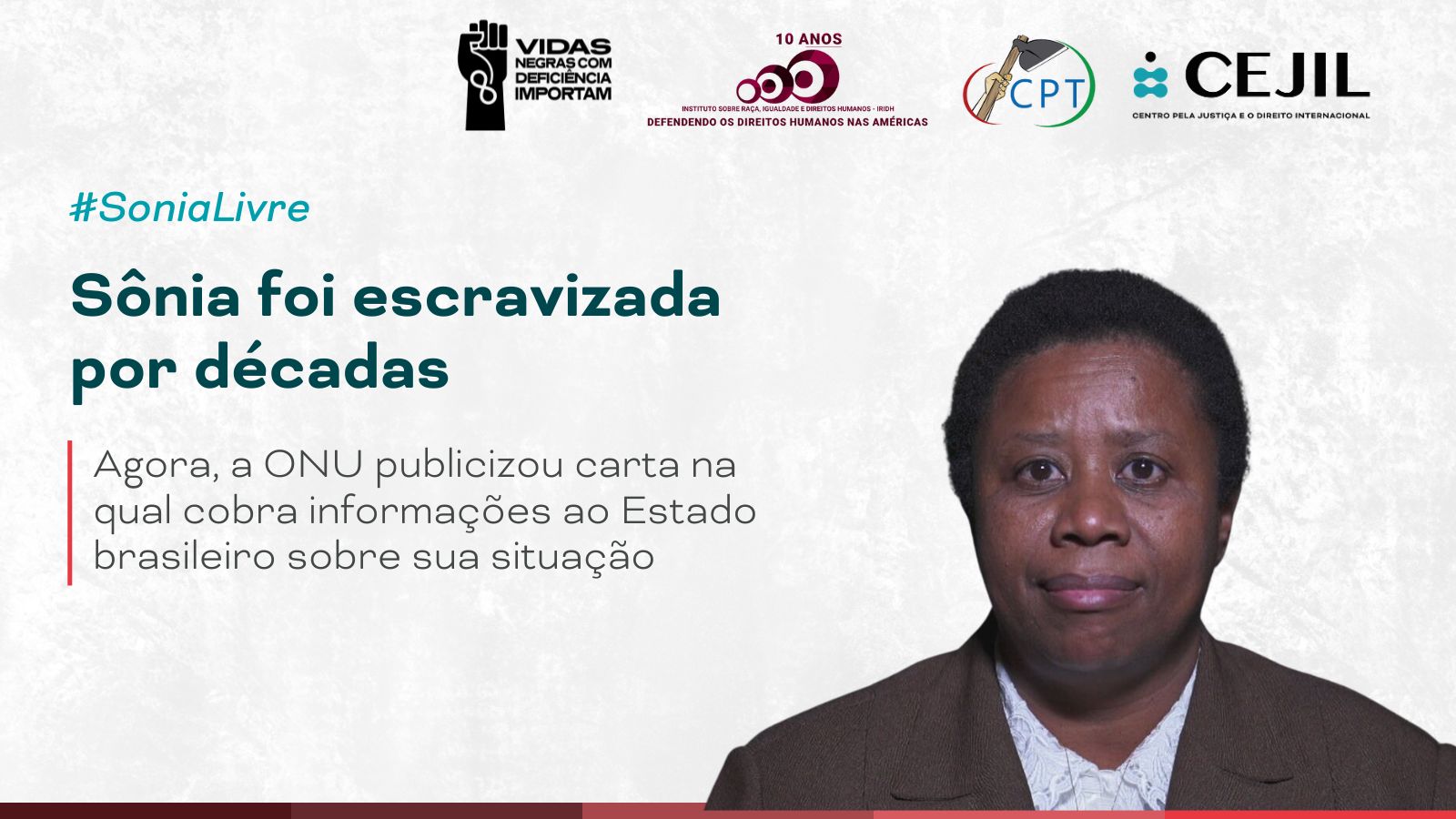The UN Releases Letter Demanding Information from the Brazilian Government Regarding the Case of Sônia Maria de Jesus
Sônia Maria de Jesus, a Black woman with multiple disabilities, was subjected to decades of domestic servitude by a family with ties to the judiciary. Four UN Special Rapporteurs and […]

- Sônia Maria de Jesus, a Black woman with multiple disabilities, was subjected to decades of domestic servitude by a family with ties to the judiciary.
- Four UN Special Rapporteurs and a Working Group sent an official communication to the Brazilian government expressing serious concern over the case, urging immediate action to prevent Sônia’s revictimization and to ensure her rights are upheld.
- In late 2024, representatives of Sônia’s family, along with CPT, CEJIL and the Institute on Race, Equality and Human Rights, brought her case to the United Nations, calling for justice and guarantees of non-repetition.
Rio de Janeiro, Brazil — April XX, 2025. Four UN Special Rapporteurs have requested clarification and an official response from the Brazilian government regarding the case of Sônia Maria de Jesus — a Black woman with multiple disabilities and who is illiterate — who was subjected to conditions akin to modern-day slavery from childhood by a family in the state of Santa Catarina, one of whose members is a judge.
The UN officials — focused on human trafficking, the rights of persons with disabilities, contemporary forms of racism and racial discrimination, and modern forms of slavery — along with the UN Working Group on Discrimination Against Women and Girls, made public their letter to the Brazilian government. The letter expresses concern over the reported violations, the ongoing risk of revictimization, and the dangerous precedent this case may set.
The rapporteurs emphasized that the reported facts suggest violations of multiple rights protected under various international treaties. They also highlighted their deep concern over a judicial ruling that ordered Sônia’s return to the same residence where she had allegedly been enslaved — a decision that contradicts both national and international victim protection protocols and risks further revictimization.
In addition to requesting information, the UN urged the Brazilian government to outline the steps it has taken to protect the human rights of Sônia and her family, to investigate the alleged violations, and to strengthen public policies to combat modern slavery and human trafficking — particularly in domestic work and in cases involving people in heightened situations of vulnerability, such as Black women and persons with disabilities.
“For us, Sônia’s siblings, it is both a relief and encouraging to see that at least one institution has shown sensitivity and taken a stand,” said Marta de Jesus, Sônia’s sister. “The Brazilian judiciary has failed to respond properly to Sônia’s case or to ours. We are being denied the right to family life, and the courts fail to see how she could be welcomed and rebuild her life with us.”
In 1982, Sônia was taken to live with a judge’s family in Santa Catarina under the premise of protection, but she was later moved to another state without her biological family’s knowledge. For decades, she was exploited without a formal work record, access to education, or adequate medical care. Her ability to communicate was severely hindered due to a lack of proper stimulation. In 2023, Sônia was rescued following an anonymous report — but her freedom was short-lived. Brazil’s Superior Court of Justice ruled for her return to the home where she had been exploited. Her siblings only learned of her whereabouts after her rescue and have since been denied full contact with her.
At the end of 2024, Sônia’s family and the organizations CPT, CEJIL, the Institute on Race, Equality and Human Rights, and the Black Lives with Disabilities Matter Movement submitted a formal communication to the UN outlining the violations and requesting action from the Brazilian government.
While awaiting a response, the UN rapporteurs and working group emphasized the urgency for Brazil to take all necessary steps to stop the violations, prevent their recurrence, and ensure accountability. They also indicated the possibility of publicly expressing their concerns, stressing that this is an issue that demands immediate attention and that the public must be informed of its implications.

